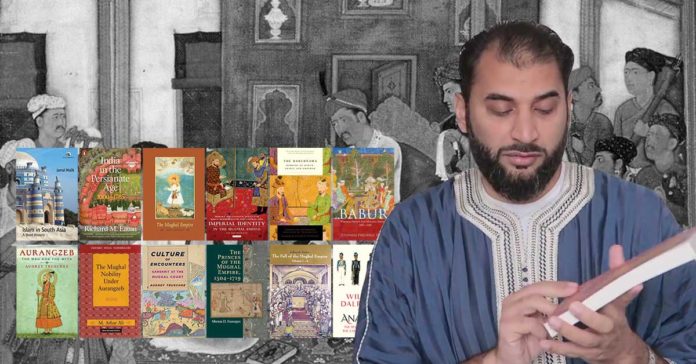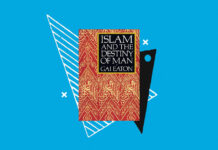This list of books on Mughal Empire has been recommended by Adnan Rashid.
Islamic South Asia has become a focal point in academia. Where did Muslims come from? How did they fare in interacting with Hindu cultures? How did they negotiate identity as ruling and ruled minorities and majorities? Part I covers early Muslim expansion and the formative phase in context of initial cultural encounter (app. 700-1300). Part II views the establishment of Muslim empire, cultures oscillating between Islamic and Islamicate, centralised and regionalised power (app. 1300-1700). Part III is composed in the backdrop of regional centralisation, territoriality and colonial rule, displaying processes of integration and differentiation of Muslim cultures in colonial setting (app. 1700-1930). Tensions between Muslim pluralism and singularity evolving in public sphere make up the fourth cluster (app. 1930-2002).
Protected by vast mountains and seas, the Indian subcontinent might seem a nearly complete and self-contained world with its own religions, philosophies, and social systems. And yet this ancient land and its varied societies experienced prolonged and intense interaction with the peoples and cultures of East and Southeast Asia, Europe, Africa, and especially Central Asia and the Iranian plateau.
Richard M. Eaton tells this extraordinary story with relish and originality, as he traces the rise of Persianate culture, a many-faceted transregional world connected by ever-widening networks across much of Asia. Introduced to India in the eleventh century by dynasties based in eastern Afghanistan, this culture would become progressively indigenized in the time of the great Mughals (sixteenth, seventeenth, and eighteenth centuries). Eaton brilliantly elaborates the complex encounter between India’s Sanskrit culture—an equally rich and transregional complex that continued to flourish and grow throughout this period—and Persian culture, which helped shape the Delhi Sultanate, the Mughal Empire, and a host of regional states. This long-term process of cultural interaction is profoundly reflected in the languages, literatures, cuisines, attires, religions, styles of rulership and warfare, science, art, music, and architecture—and more—of South Asia.
The Mughal empire was one of the largest centralized states in the premodern world and this volume traces the history of this magnificent empire from its creation in 1526 to its breakup in 1720. Richards stresses the dynamic quality of Mughal territorial expansion, their institutional innovations in land revenue, coinage and military organization, ideological change and the relationship between the emperors and Islam. He also analyzes institutions particular to the Mughal empire, such as the jagir system, and explores Mughal India’s links with the early modern world.
Having monopolized Central Asian politics and culture for over a century, the Timurid ruling elite was forced from its ancestral homeland in Transoxiana at the turn of the sixteenth century by an invading Uzbek tribal confederation. The Timurids traveled south, establishing themselves as the new rulers of a region roughly comprising modern Afghanistan, Pakistan, and northern India, and founding what would become the Mughal Empire (1526-1857). The last survivors of the House of Timur, the Mughals drew invaluable political capital from their lineage, which was recognized for its charismatic genealogy and court culture, the features of which are examined here. By identifying Mughal loyalty to Turco-Mongol institutions and traditions, Lisa Balabanlilar here positions the Mughal dynasty at the center of the early modern Islamic world as the direct successors of a powerful political and religious tradition.
Both an official chronicle and the highly personal memoir of the emperor Babur (1483–1530), The Baburnama presents a vivid and extraordinarily detailed picture of life in Afghanistan, Pakistan, and India during the late-fifteenth and early-sixteenth centuries. Babur’s honest and intimate chronicle is the first autobiography in Islamic literature, written at a time when there was no historical precedent for a personal narrative—now in a sparkling new translation by Islamic scholar Wheeler Thackston.
This book is a concise biography of Babur, who founded the Timurid-Mughal Empire of South Asia. Based primarily on his autobiography and existential verse, it chronicles the life and career of a Central Asian, Turco-Mongol Muslim who, driven from his homeland by Uzbeks in 1504, ruled Kabul for two decades before invading ‘Hindustan’ in 1526. It offers a revealing portrait of Babur’s Perso-Islamic culture, Timurid imperial ambition and turbulent emotional life. It is, above all, a humanistic portrait of an individual, who even as he triumphed in South Asia, suffered the regretful anguish of an exile who felt himself to be a stranger in a strange land.
The Mughal emperor Aurangzeb Alamgir is one of the most hated men in Indian history. Widely reviled as a religious fanatic who sought to violently oppress Hindus, he is even blamed by some for setting into motion conflicts that would result in the creation of a separate Muslim state in South Asia. In her lively overview of his life and influence, Audrey Truschke offers a clear-eyed perspective on the public debate over Aurangzeb and makes the case for why his often-maligned legacy deserves to be reassessed.
Aurangzeb was arguably the most powerful and wealthiest ruler of his day. His nearly 50-year reign (1658–1707) had a profound influence on the political landscape of early modern India, and his legacy—real and imagined—continues to loom large in India and Pakistan today. Truschke evaluates Aurangzeb not by modern standards but according to the traditions and values of his own time, painting a picture of Aurangzeb as a complex figure whose relationship to Islam was dynamic, strategic, and sometimes contradictory. This book invites students of South Asian history and religion into the world of the Mughal Empire, framing the contemporary debate on Aurangzeb’s impact and legacy in accessible and engaging terms.
This paperback edition of a classic not only tests a number of popular hypotheses about the Mughal Empire during the reign of Aurangzeb by examining the composition and the role of nobility under his rule, but also assesses afresh the material and questions that have been thrown up since 1966.
Culture of Encounters documents the fascinating exchange between the Persian-speaking Islamic elite of the Mughal Empire and traditional Sanskrit scholars, which engendered a dynamic idea of Mughal rule essential to the empire’s survival. This history begins with the invitation of Brahman and Jain intellectuals to King Akbar’s court in the 1560s, then details the numerous Mughal-backed texts they and their Mughal interlocutors produced under emperors Akbar, Jahangir (1605–1627), and Shah Jahan (1628–1658). Many works, including Sanskrit epics and historical texts, were translated into Persian, elevating the political position of Brahmans and Jains and cultivating a voracious appetite for Indian writings throughout the Mughal world.
The first book to read these Sanskrit and Persian works in tandem, Culture of Encounters recasts the Mughal Empire as a polyglot polity that collaborated with its Indian subjects to envision its sovereignty. The work also reframes the development of Brahman and Jain communities under Mughal rule, which coalesced around carefully selected, politically salient memories of imperial interaction. Along with its groundbreaking findings, Culture of Encounters certifies the critical role of the sociology of empire in building the Mughal polity, which came to irrevocably shape the literary and ruling cultures of early modern India.
For more than 200 years, the Mughal emperors ruled supreme in northern India. How was it possible that a Muslim, ethnically Turkish, Persian-speaking dynasty established itself in the Indian subcontinent to become one of the largest and most dynamic empires on earth? In this rigorous new interpretation of the period, Munis D. Faruqui explores Mughal state formation through the pivotal role of the Mughal princes. In a challenge to previous scholarship, the book suggests that far from undermining the foundations of empire, the court intrigues and political backbiting that were features of Mughal political life – and that frequently resulted in rebellions and wars of succession – actually helped spread, deepen, and mobilize Mughal power through an empire-wide network of friends and allies. This engaging book, which trawls a vast archive of European and Persian sources, takes the reader from the founding of the empire under Babur to its decline in the 1700s. When the princely institution atrophied, so too did the Mughal Empire.
The four volumes together comprise a detailed study of the causes and the result of the events between 1707 1803, that is between the death of Aurangzib and the conquest of Delhi. Dr Sarkar s pioneering work is based on a close examination of contemporary sources and documents. The fourth edition of this book includes extensive footnotes listing the best sources available on the subject, scholarly acknowledgement of other historians views, and detailed identification in present-day India of the villages and towns mentioned in the book.
The story of how the East India Company took over large swaths of Asia, and the devastating results of the corporation running a country.
In August 1765, the East India Company defeated the young Mughal emperor and set up, in his place, a government run by English traders who collected taxes through means of a private army.
The creation of this new government marked the moment that the East India Company ceased to be a conventional company and became something much more unusual: an international corporation transformed into an aggressive colonial power. Over the course of the next 47 years, the company’s reach grew until almost all of India south of Delhi was effectively ruled from a boardroom in the city of London.
Watch the full video here, and don’t forget to follow us on Instagram (@themuslimreaders) for book recommendations on various topics.









